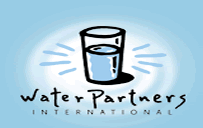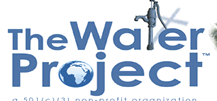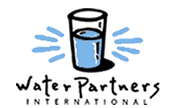
|
Serves families in the poorest communities in the world as they implement community-managed projects that integrate water supply, sanitation, and health education.
|
 |
WaterPartners International is a U.S.-based nonprofit organization committed exclusively to providing safe drinking water and sanitation to people in developing countries. Since its inception in 1990, WaterPartners has transformed thousands of lives with access to safe water and sanitation in eight countries - Bangladesh, El Salvador, Ethiopia, Honduras, Guatemala, India, Kenya, and the Philippines.
|
 |
The Water Project, Inc. is a Christian non-profit, charitable organization that works to bring relief to people in communities around the world who suffer needlessly from a lack of access to clean water. Most of our work in advancing the effort to help bring clean water to places like Kenya and Cameroon happens online. We have very few administrative expenses. So, every dollar donated to a water project site is sent directly to organizations who are doing actual construction. The Water Project, to date, has helped over 10,000 Africans improve their access to clean water.
|
 |
Project Clean Water was founded in 1997. It is a non-profit charity foundation that is working to improve the quality of life for millions of people, by helping to provide clean water on a global scale. Project Clean Water targets villages around the world with clean water problems, and finds sustainable solutions to provide them with safe drinking water.
|
 |
Since October 2005, the Rwanda Clean Water Project has partnered with Catalyst to raise money for families that lack the basic necessity of clean water. We have hit our goal of $1 million but not everyone in Rwanda has clean water, so our job isn't done. Please help us by finding a creative way for you and your church, organization or family to get involved.
|
 |
Children's Hunger Relief Fund has been serving the needs of poor children and their families since 1975. Since that time we have grown from a few million dollars to providing over $36 million in relief and development assistance per year. We are working in the following countries: Afghanistan, India, Kenya, Mexico, Nicaragua, Rwanda, South Africa, Sri Lanka, Sudan, Uganda and Zambia
|
 |
Uganda Clean Water Project
A major initiative of the Rotary Club of Bainbridge Island, WA, for the 2007-2008 year is to provide clean water for citizens of the Kaberamaido and adjacent Districts in Uganda. In April 2001, two Rotarians from our club visited six schools in the Kaberamaido District of Northern Uganda. At a school in the rural village of Ochero, children were noticeably less healthy in appearance. When it was learned that the school lacked a nearby source of clean water, the Rotary Club of Bainbridge agreed to drill a well on the primary school campus in 2002, and our clean water initiative was launched. In 2007 we completed the 44th deep water well.
|
 |
The first mission of The Samburu Project is 25 Wells. The biggest issue in Samburu, Kenya is not HIV/AIDS, poverty or genital mutilation. It's the lack of clean water. Samburu women walk up to twelve miles every day looking for water and often return home to their children with nothing. The water issue affects every aspect of their daily lives including health, education, finances and family dynamics. It takes approximately three days and $12,500 to build a well that could benefit up to 2,000 people. The Samburu Project aims to build twenty-five wells in Samburu, Kenya. |
 |
Water for People - Water For People helps people in developing countries improve quality of life by supporting the development of locally sustainable drinking water resources, sanitation facilities, and hygiene education programs. |
 |
WDA’s Appropriate Technology Study Group, in partnership with Sadhana Village and Madhindra United World College of India, seeks to understand the cultural, social and religious barriers to appropriate water technology. The inspiration this study group came from our research and first-hand experience, both of which indicate the importance of taking a whole systems approach rather than focusing narrowly on technological obstacles and solutions.
|
 |
The Uganda Village Project is a nonprofit organization that collaborates with diverse partners on the design of sustainable rural health and development solutions through networking, advocacy and project innovation in Iganga District.
|

|
WaterAid is dedicated exclusively to the provision of safe domestic water, sanitation and hygiene education to the world's poorest people.
|
 |
Bill & Melinda Gates Foundation - The Foundation works with a wide range of partners to invest in effective sanitation approaches that will contribute to a world where children and families lead healthier, more productive lives. It invests in approaches that help end open defecation and unsafe sanitation in rural communities and helps develop the tools and technology that will allow the urban poor access to sustainable non-piped sanitation.
|

|
The Council exists under a mandate from the United Nations. They are governed by a multi-stakeholder steering committee elected by the Council's members, combining the authority of the UN with the flexibility of an NGO and the legitimacy of a membership organisation. They focus exclusively on those people around the world who currently lack water and sanitation, with all their policies and work aimed only to serve those people. They have a special interest in sanitation and hygiene and emphasize the need to view water, sanitation and hygiene (WASH) as an inseparable trinity for development.
|

|
The goal of the Blue Planet Run foundation is to raise money and awareness about the global water situation by conducting the longest relay run in history. The event will consist of an international team of 18 runners; they will sprint around the world for 100 days, 24 hours a day through 16 countries; they will activate the foundation's message all the while. The Foundation has already funded more than 40 projects in 12 countries. They expect to raise enough money to provide over 35,000 people with clean water while also raising awareness.
|

|
Founded in 2002, Ethos™ Water takes a unique approach to doing business -- it is the bottled water that helps children around the world get clean water. It's a powerfully simple concept...Water for Water. For every bottle purchased, Starbucks will contribute 5 cents for each sale of Ethos toward their goal of raising $10 million in the next 5 years to go directly to clean water projects in underdeveloped countries.
|

|
The charity supports water, sanitation and health projects worldwide. It also assists in providing water purifying tablets, water containers and hygiene packs to the victims of disasters, such as in times of major floods and earthquakes.
|

|
Thirst Relief strives to provide clean water to underserved areas and they work in conjunction with a worldwide distribution network of humanitarian relief organizations, missionaries, churches, and other tax-exempt 501(c)(3) organizations. In most cases, these trusted partners are already operating at the point of need, and provide the advantages of language understanding, cultural sensitivity, and established relationships with the beneficiaries. This highly integral distribution network is used to help identify clean drinking water needs, provide input to formulate the best pure water solution, and ultimately assist with the distribution and implementation of the clean water systems.
|

|
Global Water is an international non-profit, non-sectarian, and non-governmental humanitarian organization solely committed to the development of safe water-related projects around the world. To achieve this goal, Global Water has modified its mode of operation from an advisory, coordinating, and educational entity into an equipment-oriented project organization.
|

|
WSUP's mission is to advance the Millennium Development Goals for water, sanitation, and associated health benefits through multi-sector, stakeholder partnerships delivering sustainable, equitable, and affordable water and sanitation services to the urban poor in developing countries.
|

|
WaterPartners International is challenging the traditional approach to assisting people in developing countries. Their goals are to draw attention to the world's number one health problem, unsafe and inadequate water supplies, and to raise funds to help fight this immense problem--one community at a time. One major focus is to develop high quality, sustainable water projects - They use their expertise to foster high-quality, sustainable, community-level water supply projects. They promote innovative solutions that enable communities to take a leading role in solving their own water supply problems.
|

|
The End Water Poverty campaign is demanding that governments provide sanitation and water for the world's poorest people. They are calling for: One global action plan for sanitation and water monitored by one global task force; 70% of aid money for sanitation and water to be targeted at the poorest countries; Water resources to be protected and shared equitably
|

|
The Global Water Challenge is an initiative to save lives and reduce suffering in the developing world by providing safe drinking water, sanitation and hygiene education to people who lack these basic services. Launched by a diverse coalition of corporations, foundations, and aid organizations, the GWC is a unique partnership to build healthy communities and provide sustainable solutions to ensure the availability of potable water for those in need. The goal of the GWC is to bring safe water and sanitation to millions by identifying and multiplying the solutions that work.
|

|
Water Advocates is the first US-based nonprofit organization dedicated solely to increasing American support for worldwide access to safe, affordable and sustainable supplies of drinking water and adequate sanitation. Their purpose is advocacy, not implementation of projects. Water Advocates works with all sectors of American society to increase public and private-citizen funding for effective water, sanitation and hygiene projects and initiatives internationally, particularly those characterized by strong community involvement.
|

|
Healing Waters International works to reduce water-related illnesses and deaths in developing countries by building self-sustaining projects that make safe drinking water accessible to the poor. |